Ellen and Jim Have a Blog, Too
We are two part-time academics. Ellen teaches in the English department and Jim in the IT program at George Mason University.


_Pallisers 8:16: Insider politics, gut instinct, its drive and blindnesses (1) · 11 November 08
Dear friends,
Yesterday I put up the first blog on 8:16: I described the themes, new mood, different configuration of characters (with Mr Bonteen [Peter Sallis] as star), and compared the Phineas Redux group of Parts to Trollope’s Phineas Redux. Today I go on to a summary of the scenes of 8:16, but lest the blog get overlong, I’ve again divided it into two parts, again at the 4th episode: as in the fourth act of a play, there is again a change of tone here. The last blog will be transcripts of two remarkable scenes, one melancholic over a coronet seen in a mirror, the other a treacherous politically-motived dinner.
It’s said most people vote their gut instinct when they get inside a voting booth; well, the theme of this part is not just insider politics, but gut instinct, its irrational adherences, its drive and blindnesses, both in love and ambition. The only characters who seem in real control of themselves are Madame Max (Barbara Murray) and Dolly Longestaffe (Donald Pickering), but she is intensely in love with Phineas (Donal McCann) and Dolly’s gut instinct is to avoid life by his ironical stance. The Prime Minister Gresham (G for Gladstone, played by Robin Bailey) is attempting to stay in power by jockeying between the gut instincts of his followers.
First, the count, 19 scenes altogether:
5 scenes of Lizzie (Sarah Badel) matter: opening with Bonteens (Peter Sallis and June Whitfield), then with Emilius (Antony Ainley), then the escape (separated into 2 scenes), then again with Bonteens (short but effective, he is so alert to her shoulders and covers them, he does sniff out that Emilius is a criminal type), and finally Mr Bonteen’s strategem for her.
4 scenes of Duchess’s strategems: second scene of part with Madame Max, plotting for husband for Adelaide; as presiding saloniere; upstairs first with Monk (Bryan Pringle) and Erle (Moray Watson) trying to influence, then with Fawn (Derek Jacobi), manipulating, setting up; third with husband, fourth at dinner
2 & 1/2 scene for Phineas: complaining to Madame Max in second scene; in 5th, Phineas reads People’s Banner to Dolly, and they talk, then Bonteen comes in and picks a quarrel by insulting him; then again confiding late at night in Madame Max it’s Bonteen and how he hates Bonteen. Phineas one of those in Duchess’s scene of drawing Bonteen out.
6 scenes of Adelaide (Jo Kendall) and Gerard Maule (Jeremy Clyde) matter, counting the introductory strategem onces: Lady Glen (Susan Hampshire) goes to Marie (Barbara Murray); then Lady Glen tells Fawn (Derek Jacobi); then dinner scene where we first see Adelaide; then Adelaide and Fawn walking in the park meeting Gerard; then Gerard at club with Dolly (Donald Pickering), and then Gerard and Adelaide in park again (short but effective energy between them, sparks of sexual play): 6 scenes altogether
5 scenes which include politic matter: some of these must be counted twice as they are also Duchess scenes, so the third salon scene, four upstairs one with Duchess, Monk (Bryan Pringle), Erle (Moray Watson); dinner with Adelaide where decimal coinage as inflationary discussed; dressing room with Duke asking him to find a place for Phineas, dinner where Bonteen exposed, Prime Minster’s chambers
1 scene for Laura & Lord Brentford (Anna Massey, Lockwood West), Phineas (Donal McCann) 1/2 with Lord Brentford and 1/2 with Laura.
Looking over the count and watching the mood, pivot, content of the scenes carefully, the part also stars the Duchess. She is as central to it (the great strategist) as her and Lizzie Eustace’s apparent victim, Phineas’s enemy, Bonteen.
**************
Episode 36: “Lizzie’s Dilemma.” Scene 1) Bonteen’s front room in London. Source for this scene is one clause from Phineas Redux, Vol II, Ch 45, p 41 (1982 Oxford PR, ed JC Whale, “Some passages in the life of Mr Emilius”, ... she threw herself into the hands of the Bonteens”). We first see Lizzie and Mr and Mrs Bonteen through the mirror
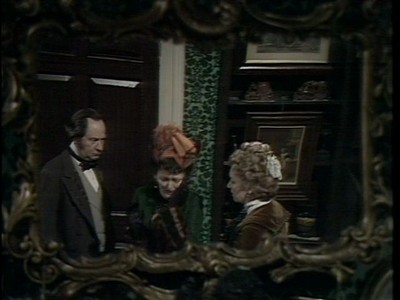
Lizzie (Sarah Badel) seen in mirror with Bonteens (Peter Sallis, June Whitfield)
which makes the action seem a performance (and it is that mostly on Lizzie’s part). We then have a shot of her from the back, her performance over:
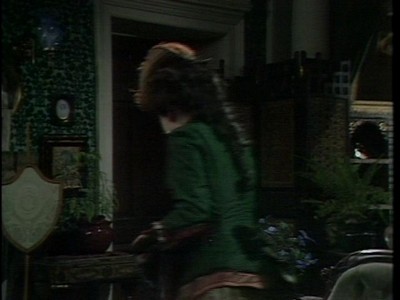
Performance over, her face is hidden.
We then watch all three interact without theintervention of a mirror.
The effect of this camera work is first to distance us and make us feel the Bonteens are more sincere than Lizzie, Mr Bonteen (alas, poor man) a lot more than Mrs Bonteen who is alerted by her sexual jealousy; she manifests justified intrasex antagonism. The important still is the one where Lizzie’s face is kept from us (and them), but it’s echoed by Mr Bonteen from the back in Scene 10 (see below). Lovely rich dark drab and emerald greens dominate the scene. (In the opening of CYFH? Trollope tells us what an ugly green room Alice Vavasour let herself be drawn into accepting; here green takes on the connotation of fearful allurement; green stands traditionally for jealousy too). Some memorable comic lines well-delivered:
Lizzie: “Forgive me. My dear husband, the Reverend Emilius, is an odious hypocrite who does nothing but loaf around the house all day, guzzling, and sipping and nuzzling” (disgust)
Mrs Bonteen: “Nothing but guzzling, sipping and (hesitant) nuzzling …”
The important thing is Lizzie’s performance has succeeded in inveigling Mr Bonteen really to act on Lizzie’s behalf. Raven’s Lizzie has again found a male “protector.” (This one will pay with his life as Raven’s Frank and George refused to.) Yet there is something real here to be feared, as she shows quite a bruise on her arm:
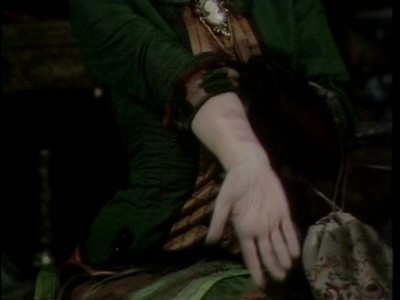
Lizzie’s bruised arm
Scene 2) Madame Max’s London front room. First part wholly invented: In Trollope’s Phineas Redux Adelaide belongs to Lady Chiltern’s group of characters; Adelaide stays at Harrington Hall when Lady Chiltern goes to London and is there when Lady Chiltern returns. Here Adelaide is introduced and reconfigured into the Duchess’s group of characters in London. In Raven’s PR, Lady Chiltern is for the most part eliminated, just heard of, not shown since 5:10 ( and until 8:17 and then only briefly).
The Duchess, returned from Matching, brings Marie flowers. They speak solemnly, piously, of the Duke. They are reminding the audience he’s dead and Lady Glen now Duchess—this is a stilted (for me) unconvincing moment. Then the Duchess comes to her topic: the Palliser family are sending her a female cousin of the Duke’s: “2nd, 3rd, ... 4th … oh I can’t work it out, but undeniably a cousin and an orphan like myself to boot.” Adelaide Palliser is to be “launched into the world”, and the Duke has “generously” offered to help, only (as the Duchess says) “it’ll be me that’ll have the handling of her.” What should she do with a girl “too young for me … too old for the boys, and she’s much too poor to be let loose in the shops:”
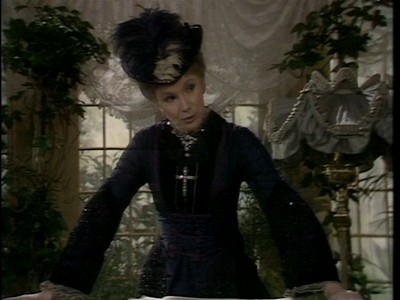
What shall I do with her? (The duchess, Susan Hampshire)
Marie’s reply is prompt: “Get her married.” But who? “Dolly Longestaffe”, at which the Duchess laughs: “Dolly’s much too happy sitting in his club. We don’t want him cluttered up with a wife,” and after a feint suggestion of Phineas, Marie thinks of Fawn; after all he chased Marie recently! We see here how one of Raven’s inventions is leading to another. This part of the scene is light and comfortable, with many lovely picturesque stills of the pair in costume against the feminine boudoir; the two play Victorian tunes and laugh together.
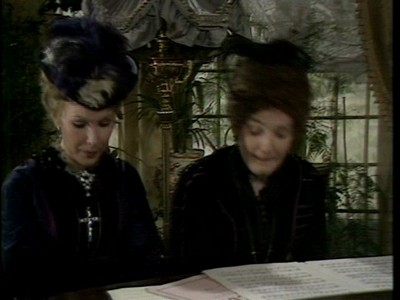
Friends concentrating (Madame Max [Barbara Murray] joins the Duchess at the piano
Again a strong note of female comradeship is hit: they are keeping one another’s spirits up through life, but mood of scene changes as Phineas enters, talks gracefully to Lady Glen who then makes herself scarce.
This second half of the scene has a source in PR, Vol 1, Ch 32, p. 289. Phineas talks with Madame Max who says: “There are shadows round your eyes. I don’t remember seeing there before.” Phineas tells Madame Goesler (as he calls her in this scene) he’s feeling excluded from his fellow politicians because of Slide’s attacks using the Kennedy scandal; he hears from Marie only the realistic comment that “you cannot reasonably expect to take up again where you left,” upon which he says he is not even being considered, has not even been invited to an important meeting “of selected liberal supporters.” As yet he does not blame Bonteen though in the source scene Madame Max brings Bonteen up; in the source scene there is also protofeminist talk by Marie:
Marie: “But you have the excitement before you of making a good speech in answer. You are in the fight. A poor woman, shut up in a cage, feels there more acutely than anywhere else how insignificant a position she fills in the world.
Phineas: “You don’t advocate the rights of women, Madame Goesler?”
Marie: “Oh, no. Knowing our inferiority I submit without a grumble; but I am not sure that I care to go and listen to the squabbles of my masters” (Vol I, Ch 30, p. 288, “The world becomes cold”)
Raven removes Trollope’s acute woman’s perspective and we see only her strong feelings for Phineas’s exclusion which she keeps hidden from him:
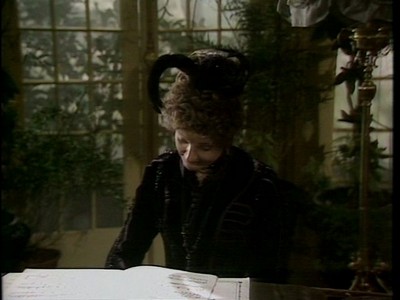
Marie quietly feeling for Phineas
Scene 3): New Duke of Omnium’s drawing room, the meeting Phineas excluded from. Establishment shot is Omnium (Philip Latham) giving up folder to Gresham, symbolizing his giving up Chancellorship of Exchequer. This is yet another of the large salon scenes in the series, most of which have no direct source in the novels. They are hard to film, but theatrical, effective ways of conveying information and change. Though the Duke and Duchess come back to town (Ch 31), there is no such scene in PR (so wholly invented), only suggestions by the narrator of meetings of men from which Phineas excluded. In these very effective dramatic movement scenes throughout the Palliser series, characters form and reform groups and we move from group to group, sometimes in the company of a lead character. Here it is occasionally the Duchess whom the camera tracks now and again. The camera also captures how she enlists Collingwood (Maurice Quick) to invite people upstairs, and he is doing her bidding continually.
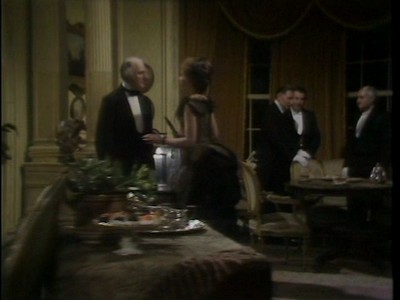
Collingwood (Maurice Quick) and the Duchess confer
Phases: The Duchess and Bungay (Roger Livesey) look confiding (though really they are not confiding in one another at all) where he assures her “nothing radical” will be done (he doesn’t want it) and she grieves for her husband’s having to give up Exchequer, to be told the new Omnium is “to become Lord Privy Seal,” and off he goes. The shots establish their congeniality of character:
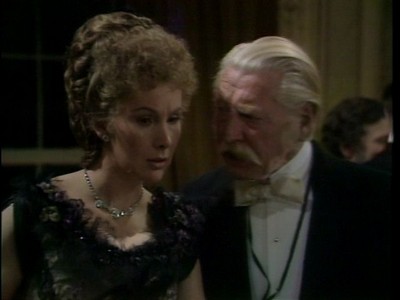
Duke of St Bungay (Roger Livesey) seems to confide in the Duchess
Next she sees Fawn (a tracking shot from afar follows her), approaches him and invites him upstairs. The camera shows us Gresham showing file folder to Omnium and Bungay; Duchess to them hoping they have everything they need. Camera swings to Monk, Bonteen and Erle, with Bonteen again needlessly, it seems obsessively insinuating distrust of Phineas Finn’s loyalty, met by Monk’s indignation and self-defense.
When Bonteen is called by the Duke to speak to Gresham (a big but as in life almost overlooked moment); Collingwood moves to Erle and Monk to whisper to them to go see Duchess upstairs (a parallel with Fawn, but they don’t know this and look flattered and pleased). The scene closes on camera showing a little from afar or an angle, that first group we opened on: Gresham and his circle. Omnium is gesturing to Bonteen to show his “stuff,” and Bonteen replying with serious knowledgeable talk about improving trade (Germany now a rival, the US), and we hear Gresham’s closing words: “Could you expand a little Mr Bonteen …”
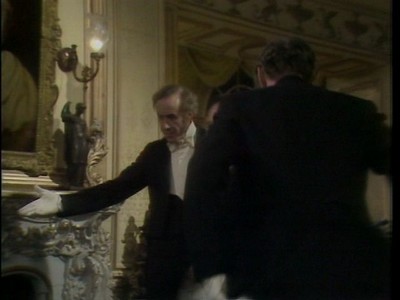
Bonteen stepping up to central place in talk
Episode 37: “Glencora’s Plan.” Scene 4) Wholly invented. The Duchess’s room upstairs, salon still going on downstairs. Establishment shot shows Monk and Barrington Erle talking with the Duchess, all comfortable on elegant plush couches and clubchairs. She wants to know “at once” what the party is planning for Bonteen, and Monk says he hopes “not much;” Barrington protests he doesn’t know what she has against him, no reason given but Duchess proceeds to ask if they can’t “do something for that nice Mr Finn.” Barrington refers to scurrility of someone who is talked about “as a married man’s lover” and Duchess laughs at him: “it happens every day.” But “it don’t get into the newspapers every day.” Erle defends the choice of Bonteen as someone who has “been doing excellent work at the Board of Trade” and who else has? The Duchess protests against the word:
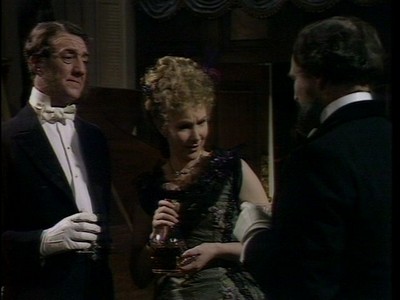
“Trade? If you’r going to use words like that here …” (Monk [Bryan Pringle], Duchess [Hamshire], Erle [Moray Watson])
They are interrupted by Fawn’s entrance and we see on the other side of the door, Erle’s resentment; 2nd phase of scene between Duchess and Fawn; I find his trepidation, discomfort as a male who is not included in big pow-wows of talk, has failed with women, appealing because he is honest about it. (Madame Max had liked him better in second proposal scene once he became more honest.) Duchess proposes he court Adelaide, admitting that Adelaide has no money but that she and Duke could do something for them, and Fawn court needs an heir.
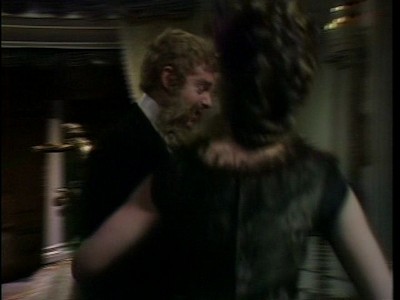
Duchess (Hampshire) inspiriting Fawn (Derek Jacobi)
In the Duchess’s encouragement of Fawn we have another instance of her attempts to use her position to manipulate events (have power) which ends up with unintended consequences.
Scene 5) The Club. Source: Vol I, Ch 28, p 247 (the newspaper article by Slide asking why were not the police called) turns into dramatic scene; this is melded with Chs 34, pp. 309-12, 310 (“The Universe”). Dolly asks “why not at Park Lane at the big liberal pow-wow,” Phineas replies, “Not asked, Dolly,”and then reads The People’s Banner’s thunderbolt aloud to Dolly who commiserates somewhat ironically, and says people tire of this sort of thing, upon which Phineas talks as of an event he regrets the return of Lady Laura and Lord Brentford now that Kennedy is treated like a madman (“poor wretch” Phineas says of him).
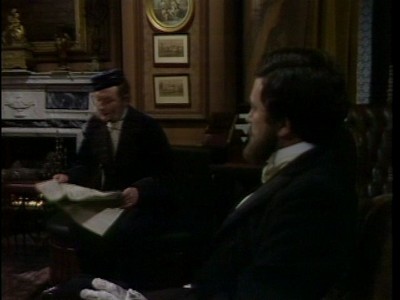
Dolly Longestaffe (Donald Pickering) reads People’s Banner
Bonteen comes in and again he needles Finn, expresses distrust and sneers at his defense of his previous votes for Irish tenant right, throwing at him his supposed promise to people at Tankerville, and especially disdainful towards end: “Very fine and large. You’re a great one for principles.”
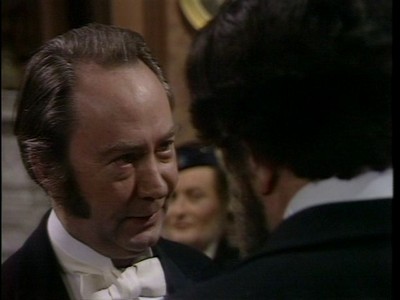
Bonteen sneers at Phineas
Close-up on Finn’s tight face which erupted into a snarl at Bonteen’s treatment.
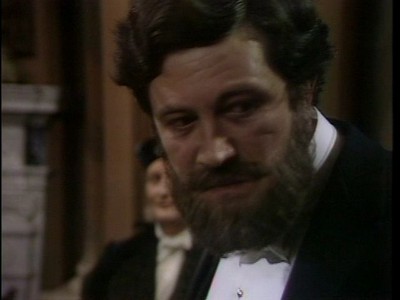
Phineas very angry indeed
Bonteen is bringing out of Finn savage impulses not natural to Finn. Foolish hubris of Bonteen brought out. Particularly in Bonteen and Finn clash words taken straight. In book it’s made plain Finn meant to be polite and open, and Bonteen wholly injust in the way he takes advantage of Finn’s openness.It leads to exchange of letters in the book (pp. 312-13)
Scene 6) Emilius and Lizzie’s upstairs bedroom in London house. Basically invented, a line from II, Ch 45, says “when the man came back bolder than ever” (from abroad, from London hotel) “she gain betook herself to the shelter of Mr Bonteen’s roof” (p. 43). It’s yet a fourth sexually connected scene between them: he comes to read Song of Songs when she is sick; his way of proposing ends in sex on the couch; one Sunday he won’t go to preach and coerces her into sex, and now the clash occurs before the bed which becomes her means of escape with sheets tied to it (irony). Another set of scenes from a marriage (a contrast to Kennedy and Laura; Phineas and Mary; Planagenet and Lady Glen)
Theatrically effective. Much of the Emilius plot in 8:15 (a bedroom scene where he half-coerces her into sex and is living off her, not working as a clergyman—the feel of this is very 1970s as a man not going to his office) comes from “Some passages in the life of” which repeats & develops the final paragraph in the closing chapter of their remarkable sexual duo in Eustace Diamonds.
Close up of her face like stone turns into a mirror image, and then we see the real woman, a bottle and glass beside her and she is slowly pouring herself a drink. Emilius comes in, all quiet cordiality. The scene reminds me of a famous one in Gone with the Wind (book and film) where after Scarlet comes downstairs to find a bottle, Rhett says to her something like “You must have needed that drink badly to come down here.” This is the reverse sentiment: Emilius says she should drink downstairs, with him, no objection to your drinking in the drawing room, friendlier that way. There is probably no memory or imitation; both rooted in same suppositions about married life and drinking. He does take drink away (as I recall Rhett does):
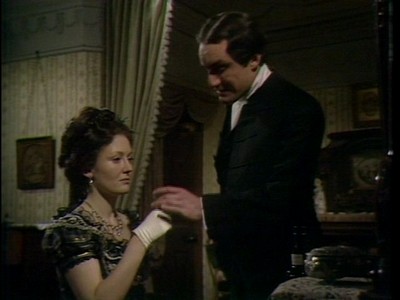
The drink
They move into an unresolved clash: he wants her to sign a bill whereby she promises to pay 800 pounds some months hence so he can have the money now; she refuses, and he (ever so genially) locks the door on her until she decides to obey her husband and follow marital duty. This is not in Trollope; he is taking her money is all we’re told. This is certainly a Trollopian motif (and used in the films, Phineas pressured by Laurence Fitzgibbon, Alice Vavasour by George Vavasour), but I also recall that in Trollope’s CYFH? (and Raven’s corresponding scene) when George got Alice to sign bills he had terrible trouble getting anyone to take it with a woman’s signature. Also violence towards women (e.g. Signora Neroni is crippled, Lady Carbury and Mrs Hurtle beaten).
Emilius is given gestures which show he could be murderous as when he takes his cravat and turns it into a tourniquet when Lizzie refuses to sign the bill. Her tearing the bedclothes preparatory to fleeing (and subsequent one where she climbs down from the window, see below) I remembered strongly afterwards (as a single whole). It was easy to re-remember as I re-watched last year. It is here we get the first use of Jew as a derogatory term:
Lizzie: “I will sign nothing and I’ll pay nothing” (almost spitting as she puts pen down).
Emilius: “Now Lizzie …”
Lizzie: “You snake.”
Emilius: “Oh ho ho ho ho …”
Lizzie: “You vampire.”
Emilius: “Oh Lizzie! (still lightly laughing).
Lizzie: “Don’t you Lizzie me, you thieving lying Jew.”
Emilius: “Oh dear. (Pulls cravat as if it were a tourniquet he is deciding what to do with …)
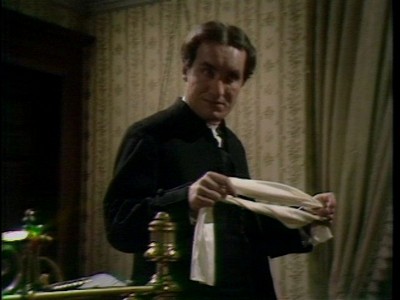
Emilius (Anthony Ainley) murderous.
She steps back.
Then the memorable dumb show (with no music) of her looking out window, going over to their bed (which she hates), and pulling off coverlet.
Episode 38: “Helping Finn.” Scene 7) Madame Max’s flat in London, late at night, Phineas confiding. Source is again PR, Vol 1, Ch 32, pp.287-89, to which is added ch 34, p 311 (“He knew himself to be superior … ”), Ch 37, pp. 332-33, Ch 40, pp. 362-63. Raven transposes Trollope’s narrator’s words into dramatic scene, p 307. Effective scene: she looks lovely in dark purple and blue evening costume in the dark (cool colors dominate this part, purples, blues, greens, black and soft yellow-browns for Laura’s dress, see below). Sombre light. Madame Max again does not show much overt sympathy and demands he buck up, but she shows pain in her face and tells him again (as she does in the book) he has friends he doesn’t know of (the Duchess.) This is the scene where he says he has not been given his “deserts,” and she replies: “If every man got those Mr Finn, we are reliably informed on the best authority that no man should ‘scape whipping. It’s Shakespeare from Measure for Measure. She hopes he does get something “better than the birch,” to which he lifts his glass.
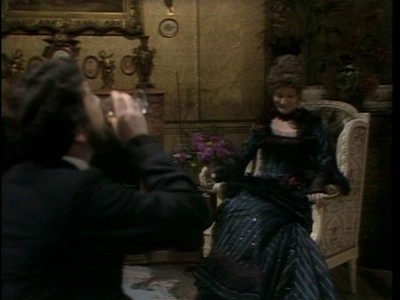
An intimate moment between Phineas (Donal McCann) and Marie
Scene 8) Continuation of Lizzie escaping from her bedroom prison. Wholly a dumbshow, no music. She is tearing sheets; she ties them together; she breathes hard, ties sheet to bedpost and pours line down over window. She puts on hat in front of mirror, ties sheet to her legs under her dress:
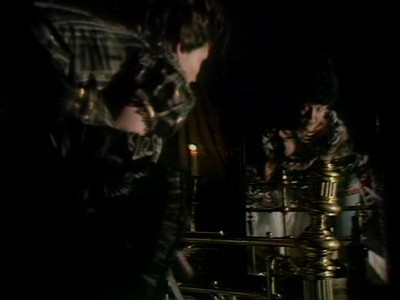
Lizzie (Sarah Badel) gazing at her appearance in the mirror, satisfied
We watch her through the mirror at she ties the sheet to her legs under her dress too. It’s a performance, something she is doing with her relationship with her society in mind (whence the mirror). She throws on a cape, blows out candle and in the dark we make out how she goes out window. The camera is then outside the window watching from just below the first movements of her climb down. A moment by moment tracking shot. Maybe we remember it because we are made to feel as if it’s occurring in the real time it takes to tie a sheet and climb out.
Scene 9) Palliser dining room, Park Lane, London. Wholly invented. A funny and relevant scene, for in the 1970s England was undergoing decimal coinage and it was inflationary. Our first meeting with Adelaide, we see how Plantagenet does not really care for Lady Glen’s semi-jokes on his hard-worked proposal; Fawn comes across as genuinely respectful, meaning well; Adelaide tells a crude joke, seeming unaware of the pun: pistols as a word for the horse’s fifth leg might do for the new farthing. The pictures tell it all but the particularities of decimal coinage and the problems there can be seen writ in Fawn’s earnest face.
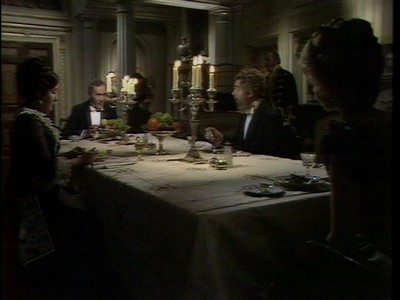
Dinner where they discuss decimal coinage, Fawn and Adelaide (Jo Kendall) meeting for first time,
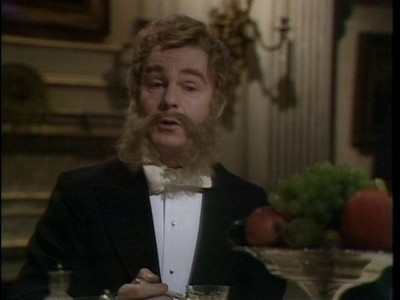
“The poor will suffer,” says Fawn
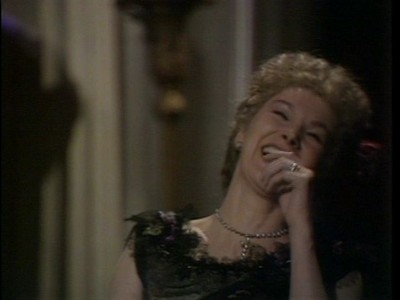
Duchess laughing at her joke about decimal coinage’s names
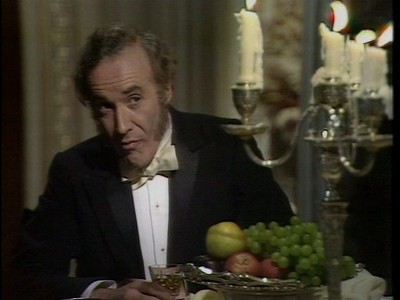
Duke (Philip Latham) not keen on joke
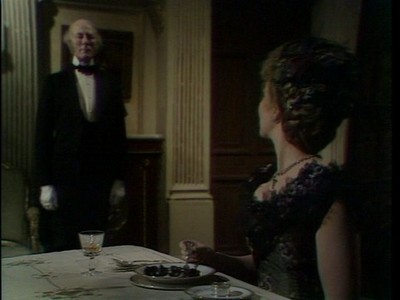
Collingwood (Maurice Quick) ever ready to follow her orders
Scene 10) Again Bonteen’s front room, London. This is a third continuation from Scenes 6 and 8; it occurs right after Lizzie has let herself down the window; she is in the same outfit and has fled to Bonteen house. Source PR, Vol II, Ch 45, p 43 (chapter “Some passages in the Life of Mr Emilius” milked for all their worth). It is here Lizzie throws herself on the Bonteens, and he can scarcely resist touching her in some way;
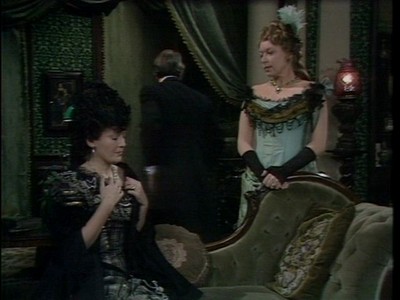
He has just found it irresistible not to put Lizzie’s shawl back on her shoulders and quickly retreated. Mrs Bonteen quietly wants to rid herself of this woman but her husband insists Lizzie has nowhere else Lizzie can be safe. Lizzie is all the while flattering Mrs Bonteen too with her abasing respect for Mr Bonteen and the coming office, plus an offer to invite them to Portray when this all is over.
Bonteen does show an awareness that he is dealing with something risky. The story of the demand for 800 pounds, the sense of some threat she fled; it’s not just that Bonteen is allured: “the man is cruel and rapacius, and even criminal in character ...” Not only one in the series: George Vavasour and Ferdinand Lopez are our two other physically dangerous people, perhaps Mr Grimes (the publican who pressures George for money, 1:2, 2:4) too. But scene ends with such a theatrically overdone emoting of pathos and gratitude on Lizzie’s part, we are kept from sympathy we might otherwise give Bonteen and his wife more whole-heartedly as they appear in these moments:
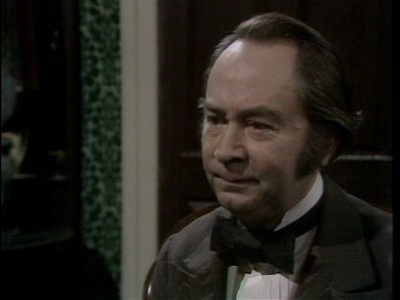
Bonteen sincere in his concern for Lizzie
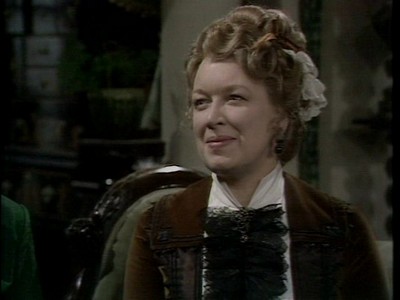
Mrs Bonteen proud of her husband’s coming promotion to the cabinet
Scene 11) Palliser’s London House, Duchess’s dressing room off her bedroom. It’s large. I have found no source, only the suggestion that after Phineas told Madame Max of his trouble, she went to the Duchess (PR, Vol 1, Ch 37, p. 334) and my memories of the Duchess’s weariness and awareness of the price she has paid for her (limited) ability to maneuvre (The Prime Minister).
A beautiful scene (see transcript of Chekhovian scene): here Marie comes to the Duchess for help for Mr Finn, and the two commune in front of the mirror, with Duchess deciding that the trick needed is to deflate Mr Bonteen (make him lose this office_) preparatory to reflating Mr Finn. Chekhovian in the way it moves slowly, is aware of time passing and irresolvable loss.
On this mood scene I break this blog here.
Ellen
See various links and a concise summary of 1:1-3:6, 4:7, 4:8, 5:9, 5:10, 6:11, 6:12, 7:13, 7:14, and 8:15, 31-33, 8:15, 34-35
--
Posted by: Ellen
* * *
Comment
- Clare commented:
“Ellen wrote:
‘Look at those lovely rich greens, will you? Alice Vavasour’s room may have been ugly being so green, but here the green is glittering shades of emerald and alluring.’
‘Yes, they are scintillating. The colour gives an attractive, yet moody image. Thanks for posting the stills, Ellen.’
Clare”
— Elinor Nov 11, 1:33pm #
commenting closed for this article
